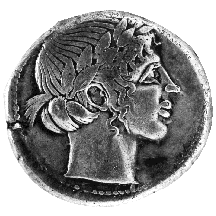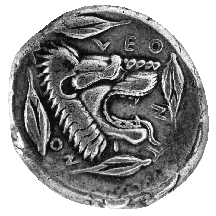



(12) Leontinoi, Sicily (Italy) - AR tetradrachm, c. 460
B.C., 17.15 g. (inv. 91.025).
Obverse: Head of Apollo r., wearing laurel wreath with
three rows of leaves.
Reverse: Lion's head r., surrounded by four barley grains;
![]() : of the Leontines.
: of the Leontines.
Provenance: Ex Fred V. Fowler collection; Stack's, 1969.
Bibliography: C.M. Kraay, Archaic and Classical Greek
Coins (Berkeley and Los Angeles 1976) 211-212, pl. 49.
Leontinoi was founded in 729 B.C. by the colony of Naxos, which had been
settled by the Chalkidians six years earlier. Located on a broad, fertile
plain inland from the eastern coast of Sicily, Leontinoi was known for its
agriculture and grew prosperous exporting grain to Greece and to other towns
in Sicily.
The coinage of Leontinoi begins in the early fifth century, when it was
ruled by tyrants dependent upon Syracuse; its coinage shows strong Syracusan
influence. In 466 B.C. the tyrannies at Syracuse and apparently also at
Leontinoi were overthrown, and Leontinoi replaced the Syracusan symbol of
the quadriga (see nos. 15-19)
with the head of its patron god, Apollo, on the obverse of its coins. The
coins continued unchanged but for stylistic development until 422 B.C.,
when Leontinoi again became subject to Syracuse.
Apollo, the main god of the Chalkidians, was brought to Leontinoi at the
time of its settlement. The head of Apollo on this tetradrachm has elements
of the Severe Style typical of Greek sculpture from c. 480-450 B.C., the
plain hair brushed toward the forehead and the heavy, prominent chin, and
should therefore be dated c. 460 B.C., early in the period of Leontinoi's
independence. The lion on the reverse is both an animal associated with
Apollo and a play on the name of the town; leon is the Greek word
for lion. The grains of barley surrounding the lion's head refer to the
agricultural importance of Leontinoi; earlier coins of Leontinoi show the
barley corns encircling the head of Apollo in much the same way that dolphins
surround the heads of Arethusa and Athena on Syracusan coins (see nos. 15-19).
K.L.M.



All contents copyright (c) 1996.
Lawrence University
All rights reserved.